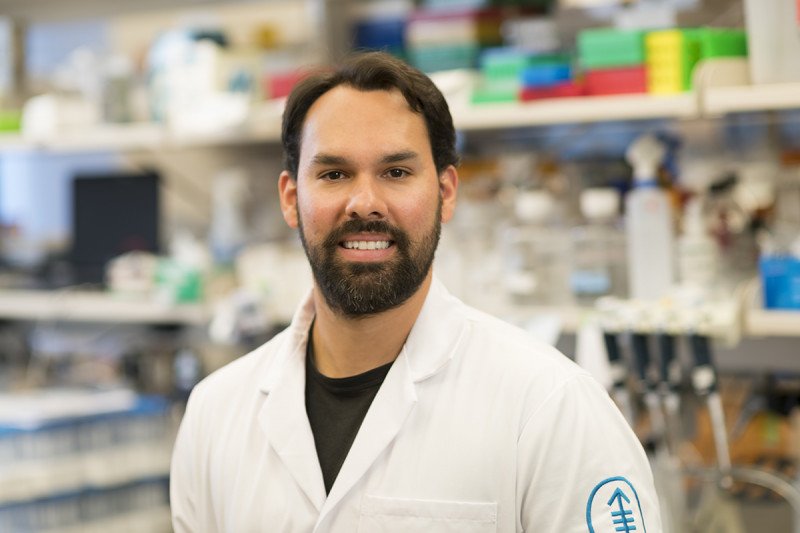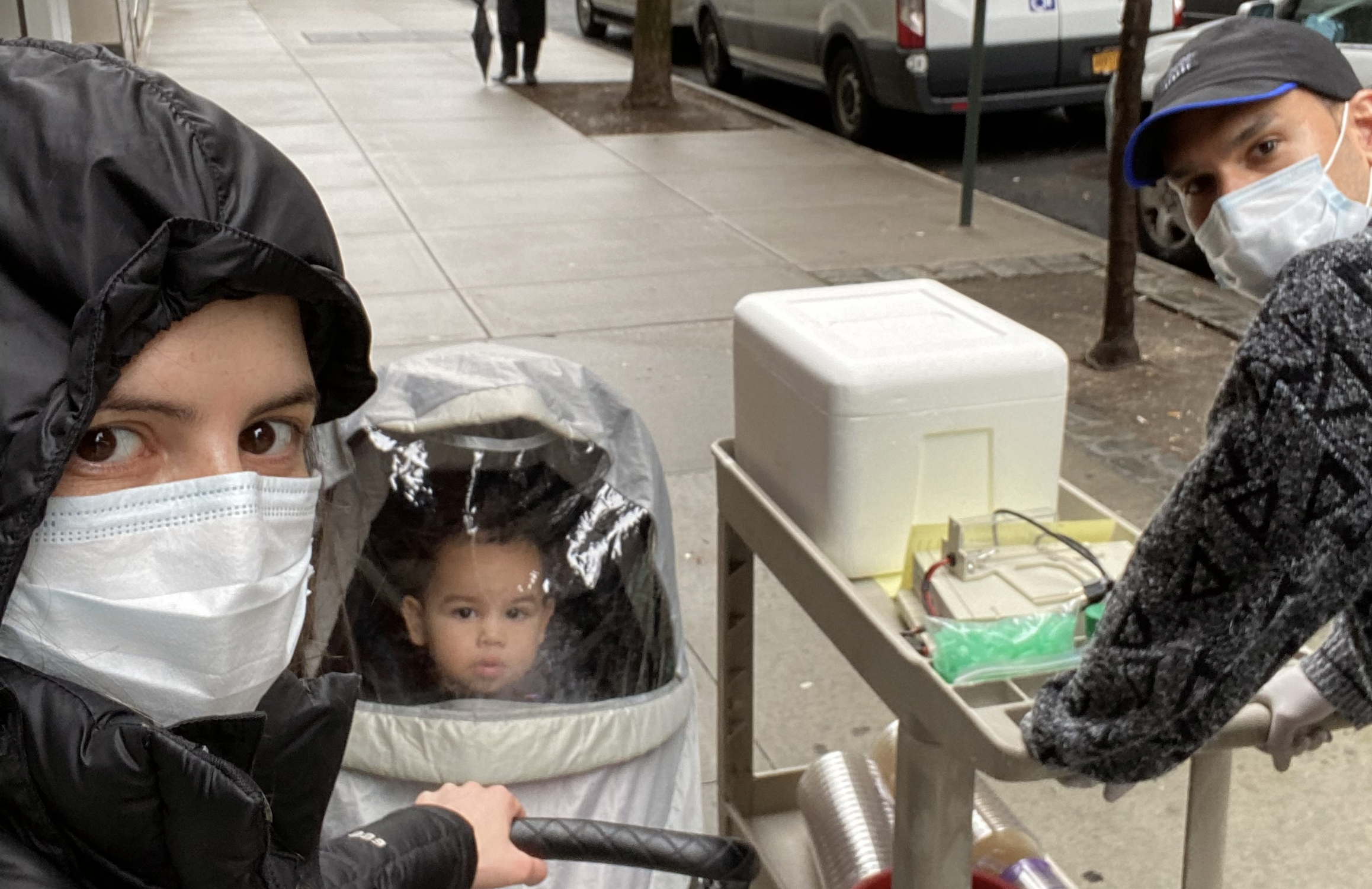
“I remember thinking I wanted to do something,” recalls Francisco J. Sánchez-Rivera, a postdoctoral fellow in Scott Lowe’s lab in the Sloan Kettering Institute. “This was back in March 2020, when the number of COVID deaths in New York were reaching 700 or 800 a day. I was getting very frustrated because as a scientist you’re trained to solve problems. And this was an important scientific problem.”
Dr. Sánchez-Rivera is an expert in cancer genetics and genomics. He realized that his knowledge and skills could be applied to the problem of understanding how SARS-CoV-2 — the virus that causes COVID-19 — infects, multiplies in, and kills people.
“Scott’s lab at SKI is known for using technologies like RNA interference and CRISPR/Cas9 to identify genes involved in controlling tumor progression and drug resistance,” Dr. Sánchez-Rivera explains. “But it’s a very flexible skillset. It can be just as effectively applied to understanding viral infection.”
So in early April, Dr. Sánchez-Rivera reached out to Charles Rice, a virologist at The Rockefeller University across the street. He proposed that the two labs collaborate on a project that would combine their expertise.
“Charlie is a world-class virologist and had just finished upgrading his lab in order to work with dangerous airborne viruses, such as SARS-CoV-2,” Dr. Sánchez-Rivera says. “So, it was good timing.” (In October, Dr. Rice won the 2020 Nobel Prize in Physiology or Medicine for his work on hepatitis C.)
They also teamed up with John Poirier at New York University whose lab specializes in cancer genomics. Together, they formed a COVID-19 working group that met twice a week over Zoom to plan and discuss ongoing COVID-19 research.
The results of their collaboration are now in. Published on December 9 and 14, 2020, in two articles in the journals Cell and Cell Host and Microbe, the studies provide a comprehensive roadmap of the host factors — the infected person’s genes, proteins, and other molecules — that SARS-CoV-2 uses to invade and replicate inside human cells.
The two studies are complementary: The study published in Cell looks at the entire human genome and gives a very broad overview of host factors that are required for infection by the virus. The study published in Cell Host and Microbe focuses in detail on a smaller subset of host factors and how they interact. Together, the studies reveal previously unknown potential drug targets for vanquishing the virus.
What the Virus Needs From Us
Both studies relied on the genome-editing tool CRISPR/Cas9. This versatile tool allows scientists to make precise cuts in the genome. The MSK, Rockefeller, and NYU scientists used CRISPR to systematically knock out genes in human cells and ask whether the loss of that gene’s function impaired the virus’s ability to infect, reproduce in, and ultimately kill the cells.
The scientists used CRISPR to systematically knock out genes in human cells and ask whether the loss of that gene’s function impaired the virus’s ability to infect, reproduce in, and ultimately kill the cells.
“If we understand how the virus is hijacking normal cells and how it repurposes host factors to reproduce itself, then each of those factors is a potential drug target,” Dr. Sánchez-Rivera explains.
The combined efforts revealed some surprising host factors and potential drug candidates. One set of factors was involved in maintaining cholesterol balance in cells. Conceivably, Dr. Sánchez-Rivera says, existing drugs that modify cholesterol levels could be repurposed to fight COVID-19 infection.
Another factor — much less familiar to the scientists — was a protein called TMEM41B. “Only a handful of papers in total have ever been written about this protein,” Dr. Sánchez-Rivera says. “But we found that it is absolutely essential for SARS-CoV-2 replication. If you remove TMEM41B from host cells, viral replication is completely halted.”
There is now strong interest to further understand this protein and potentially develop drugs that target it.
Research Under Pressure
Completing these studies during a pandemic was not easy. MSK’s laboratories shut down in late March 2020, so much of the work had to be conducted in labs at Rockefeller, which had received special exemption to work on COVID-19–related projects deemed essential by the state.
“At MSK, we were allowed to go into the lab for one hour per day, so I would go in to prepare reagents, then bring them in a cart over to Rockefeller,” Dr. Sánchez-Rivera says.
And it was all done in record time.
“We were saying to our reagent suppliers, ‘Can we get the fastest turnaround possible for this?’ And it would take less than a week.”
Dr. Sánchez-Rivera’s wife, Yadira Soto-Feliciano, is a molecular biologist working in David Allis’s lab at Rockefeller. At points she was also involved in helping out with the COVID-19 project.

Finding Common Threads
In addition to SARS-CoV-2, the scientists also included in their analyses three coronaviruses that are known to cause seasonal common colds. By comparing the COVID-19 virus to these others, the researchers were able to identify host factors used by the entire coronavirus family.
“We hypothesized that the host factors that are shared among this family of viruses may be required for future pandemic coronavirus strains as well,” Dr. Sánchez-Rivera explains. “That would allow us to be more prepared for potential future outbreaks.”
The most exciting part of the research, he says, was seeing how scientists from various research backgrounds were able to repurpose their training and expertise to tackle important challenging problems as a team.
“We’re going to need more of that in the future,” he says.